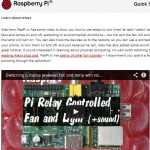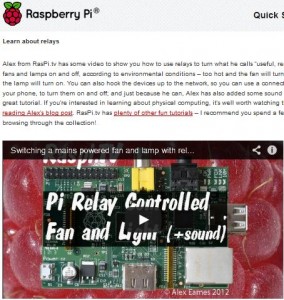
Back in November I made a Raspberry Pi controlled “light and fan relay switching” demo that you may have seen before on the Official Raspberry Pi blog.
Before it appeared on the Raspberry Pi web site, I’d previously displayed it at Milton Keynes and Oxford Raspberry Jams and I’d also taken it along to let my year 5 ICT class have a go with it.
Did they like it?
You can see for yourselves in the video what the year 5s thought of it. I didn’t tell them what was going to happen, as I wanted to catch their genuine reaction.
Questions and investigation
It prompted questions (e.g. what happens if we turn off the lights?), which led to some of those unplanned, spontaneous changes of direction and further discussions (e.g. oscillation) which make teaching so interesting and challenging.
Python
We also had a brief look at the Python script – ostensibly to check what value I’d set the temperature sensor to switch on the fan. I’d forgotten what I set it on, when asked – but it was a good excuse to get the code on the screen and show them how simple it is. The laptop was only used as a keyboard and monitor.
Gertboard + hairdryer
This wasn’t the first time I’d taken a Pi into class. I believe this class may have been one the first classes in the world to see a Gertboard in action in early October 2012. We blasted a temperature sensor with a hairdryer to see how quickly it could change the onscreen readout. We also shone torches and switched the lights on and off to change the brightness of an LED linked to a light sensor.
They’ve also recently had a go with the Wii controller Gertboard “Whackadoodle” demo.
What next?
I have (not fully developed yet) future plans involving the Pi in the classroom. The class loved Sherston Software’s Mission Control, which is a game that gets them doing some logo programming to control virtual robots, motors, lights etc. This “game” throws up some interesting surprises. I often find that the ones with the most obvious natural programming aptitude are not necessarily the ones you might have guessed purely from academic achievement. Some of them “just get it” and others need a little help.
Scratch may be the way forward
I’d love to get them involved in programming with Scratch. I’ve been offered to review a Scratch controlled robot. That sounds like a lot of fun. I know Simon Walters (cymplecy on the forums) has been doing some great work on Scratch and robotics. Also, the Raspberry Pi Foundation is working on improvements to the performance of Scratch on the Pi. All this bodes well for what looks like a suitable introduction to programming for this age group.
It’s all still a bit experimental, but as long as we’re moving towards Isn’t Computing Terrific, and away from It’s Complete Torture, I think we’re making progress. :)
Thank you to the school and to all the parents for allowing me to do this.

That’s really good – great reactions from the kids :-)